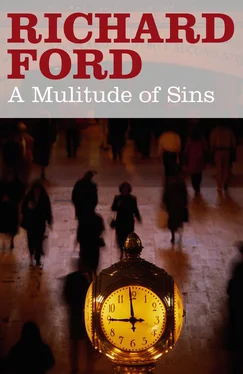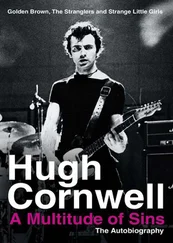Too bad, he thought, standing above the black camera, on its side on the black asphalt, too bad he hadn’t snapped Frances just at the moment she’d gone over. So many thousands of words would be saved by that luck. “Oh my.” Those were her last words to the world, apparently. He was the one who’d heard them. No one else knew that. He was very involved in this.
He grabbed the camera up then and, for a reason he wasn’t at all clear about, started back from the canyon rim toward the parking lot, not toward the tourist village where help was. Newly arrived Grand Canyon tourists-enthusiasts were strolling out of the lot in shorts and bright sweaters, carrying cameras, lugging backpacks, laughing about seeing “a big hole in the ground.” They would see him holding Frances’s camera. But there was nothing truly suspicious about him except that he was very tall and alone. Did his face look strange? Distressed?
A pay phone sat just at the border of the prettily landscaped parking lot, at the edge of some pinewoods. Pink wildflowers still grew here. Of course he should make the call. Do that much. Call in the emergency. Though there was no such thing as an anonymous call now. Everything flashed up on a screen someplace: “Howard Cameron is calling in a death.” Response would be instantaneous. And then what? He needed to think, as more visitors drifted past him chatting, chuckling. Call and say what? Explain what? Own up to what? (Since he hadn’t done anything but not take a picture.) Possibilities fluttered hotly in his face like cinders above a fire — none of them distinct or graspable, but all real, full of danger. And it was so so odd, he kept thinking: they had just arrived, and then she’d fallen in. He had wanted not to come.
He looked out across the sunny parking lot. The ranger in his campaign hat was waving vehicles past his little house, leaning in the car windows, smiling and joking with passengers. The sight of the ranger made him lonely, made him long to be miles and miles and miles from where he was — at home, or waking up, lying in bed, thinking about the day when he would sell a house, eat lunch with a friend, call his mother, drive to the playground, shoot baskets, then return at dusk to someone who loved and understood him. All that was real. All of that was possible if he didn’t call.
Though all of that would soon become a dream-life he’d never live again, since eventually, somehow he’d be trapped. Reeled in. You didn’t really get away with things. And he had come up here with Frances — if only just to fuck her; he had made crazy mistakes of judgment, mistakes of excess, of intemperance, of passion, of nearsightedness, of stupidity. Of course, they’d all seemed natural when he was doing them. But no one would see them that way. No one would take his part, even if it became clear and beyond any argument that he hadn’t pushed Frances Bilandic off the cliff (he was in the camera, his hands and feet, even his toenails had left traces in the car’s carpet, he had been seen with her often at the convention). Even if he was finally acquitted in court, he was still guilty of so much that he might as well have done it. Who actually did do it — Frances had done it to herself — was just a matter of splitting hairs. He did it. “A fuck-up, oh what a fuck-up.” He said these words out loud as strangers walked past him. A young woman carrying a baby papoose-style glanced at him and smiled sympathetically. “I just should plan things. I can’t understand,” he said in agony, because of course there was no way out of this now.
So that he simply walked to the pay phone, shining there in the morning’s sun, looped the camera strap around his wrist and began to set the whole complicated machinery of responsibility into motion.
Later in the day, when he went to find the rental car to show the park police how they’d arrived at the Grand Canyon, it was gone. Howard stood, in his shorts and T-shirt, again in the warm parking lot, gazing at the taillights of cars and campers and vans and SUVs. He walked across into the next yellow-lined row — the one he knew was the wrong one — and looked there. Nothing he saw he recognized. The big fire chief’s car was gone. It seemed unimaginable. In the sunshine, with two officers watching him, it was as though he’d invented a car. Too bad, he thought, he hadn’t.
“I just don’t know,” he said, feeling tired, confused, but inexplicably smiling, as if he was lying. “We left it right here.” He pointed to a place where someone had parked a huge white Dodge Ram Charger and emptied the contents of an ashtray on the pavement. He thought oddly about the Tito Puente CD and the bottle of gin and Frances’s purse and her cell phone and her guidebook. All gone with the car.
One of the officers was a young, stiff, short-necked blonde not so different in her appearance from Frances Bilandic, but dressed in a tight, high-waisted beige uniform with a clean white T-shirt under her tunic. She was carrying an absurdly large black-gripped automatic pistol high on her plump little hip. Jorgensen was the name on her brass name-plate. “And you are sure you drove up here in a rental car?” she said, looking up at Howard, her tiny periwinkle eyes blinking as though to penetrate him, see his soul, locate the wellspring cause of the profound dislike she’d begun to experience. His height, he thought, made him dislikable. Though who wouldn’t doubt his story? He doubted it. Nothing seemed very true.
“Yes,” he said, distracted. “I’m sure.” He watched a crow fly across the blue pane of sky above the lot. “You can call the rental-car company. She rented it. Not me.”
“And which rental-car company was that?” Officer Jorgensen said, continuing to ponder him, squinting.
“I don’t know,” he said and smiled. “I don’t know very much.”
“Did you notice anyone suspicious following you?” Suddenly she sounded almost sympathetic — as if no one should’ve followed him. He felt willing, since she was willing to be sympathetic, to think back through the day. Such a long day, so complicated with complex, terrible things. And now the stupid car. He could barely believe such a day had begun where it had, in the cool sunny breeze outside a teepee, watching an Indian woman sweep beetles off the stoop, while Frances slept. He remembered the Camaro with the flames on the side and the doughnut tire. And the little chapel where Chris died for everyone’s sins. He thought a moment about Frances saying, “Those were our ancient spirits,” last night, but couldn’t remember what had made her say that.
“No, I don’t think anyone followed us,” he said and shook his head. He looked back down the row of taillights. He felt he’d have to see the red Lincoln now. It would be there, like your wallet on the hall table — present, only for a time invisible. But no. It was far away. Something else hard to imagine.
He hadn’t done what Frances told him to do, of course, as if she’d been foreseeing everything. He remembered her advice at intervals through the day, when for a time suspicion fell upon him; when he’d been informed by a rescue crew member in a plaid shirt — while he was eating a sandwich— that Frances’s body had been recovered by use of a wire basket and cables, not a helicopter, and that her left arm had indeed become separated; when he’d heard her next-of-kin had been informed, using cards from a small beaded wallet she’d carried — something he didn’t even know about; and when he had heard Ed’s name (surprisingly, Ed’s last name was Murphy); and when the name Weiboldt Company was spoken, and then the name of his wife and the town he lived in all sounding quite peculiar in the voices of strangers; on and on and on through the details of lives that now were affected, possibly spoiled, unquestionably made less good, even made impossible because of a few misguided occurrences, and by his questionable decision to stand up for them. At several intervals — sitting in a metal folding chair in a wood-paneled office with a window that looked out into the new-but-rustic visitors’ center — he thought again that he’d compounded a mistake with a worse mistake, and that he should’ve walked away, just as Frances had said; let all he was enduring now come out not in just one day, or maybe never come out. Every single thing he’d done for two days could’ve gone unnoticed. And instead of these lengthy, wrenching moments, he could’ve been in Phoenix considering how best to put the day’s events behind him and greet the evening. Though, of course, that might have turned out to be harder. Whereas what he had done — stayed, told, accepted — might actually be easier.
Читать дальше












